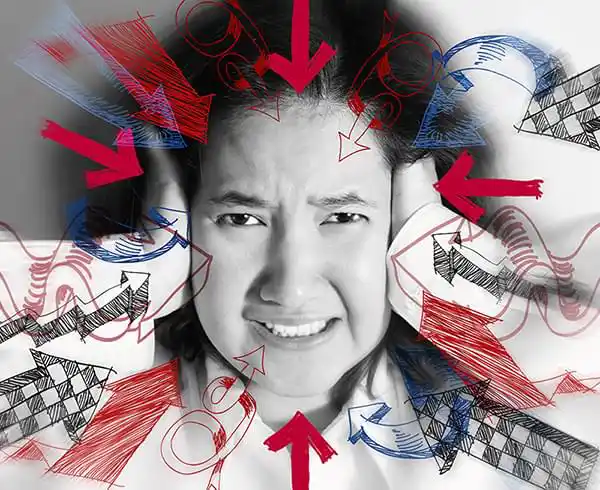Managing Stress Amidst Uncertainty

Managing Stress Amidst Uncertainty
Anxiety. Isolation. Constant worry. Overwhelming feelings. As COVID-19 continues to spread and our collective realities drastically shift, it’s easy to feel a bit ungrounded in all of the uncertainty. When will conditions improve? When will the kids get to go back to school? When will it feel safe to gather in groups again?
With the necessary shelter-in-place orders to protect public health come new health concerns: the ability to manage personal stress and mental health. Mandates to stay at home create feelings of isolation and some days, the uncertainty of what’s still to come is hard to manage. And, unfortunately, high stress also takes a toll on the immune system, which is more important to protect than ever in the current climate. Below, we’ll go into detail on why stress has the effect it does, and how you can help to mitigate it during these uncertain times.
How Does Stress Affect My Immune System?
The truth is that change equates to stress for our bodies. And, who hasn’t experienced some change over the last weeks?! The reach of COVID-19 is affecting everyone globally in different ways, but the common thread is that its unwelcome introduction has changed daily life…which is easy to find stressful.
While low-levels of stress can be motivating in day-to-day life, when it gets out of control, it’s problematic. In fact, our bodies have an actual physical response to emotional and psychological stress. You may have heard of the “fight or flight” response that kicks in during times of danger. While our ancestors initially used this system to fight off more physical dire circumstances, like encounters with wild animals, your system still kicks into gear all the same with emotional stress. Essentially, whether you’re running away from an actual predator or managing the stress of getting your kids to stay quiet during a work call from home, your fight-or-flight system kicks into high gear.
Your fight-or-flight system releases a set of hormones, increases your heart rate, and also increases your blood pressure. And, while it can be helpful for short stints, we often need help “turning it off” in today’s modern world. When we let it continue to run in the background, this system – originally designed for our protection – actually ends up overloading and compromising our immune system. And, when our immune system becomes compromised, the likelihood of getting sick drastically increases. Which, is obviously far from ideal during a global pandemic.
Fending off Feelings of Stress
While we’ve established that stress isn’t great for the immune system, keeping stress levels actually in check can be a bit easier said than done. Between adjusting to the new normal of working from home with kids to anxiety about the health of family and friends to economic uncertainty, there’s a lot to take in. It’s completely normal to feel overwhelmed. However, as we work through this new normal, it’s also imperative that we learn how to best cope with stress for better overall health. Below are some of the top methods you can implement now, from the safety of your home.
Get Good Quality Sleep
It may sound basic, but sleep is the number one way that you can support your immune system, reduce stress…and keep your sanity intact, too. When we get enough quality sleep (7-9 hours per night for adults), our bodies use the time to repair and support the immune system, as well as regulate blood pressure related to stress. Alternately, when we don’t get enough sleep, infection-fighting antibodies decrease and we’re more likely to get sick after being exposed to illness. We also take longer to recover if we do get sick while our sleep quality and duration are low.
Treat sleep like your superpower, adhering to a consistent sleep-and-wake schedule, reducing screen time prior to bed, and by making your bedroom a welcome place to doze off.
However, if you’re struggling to sleep due to anxiety and stress, this may be easier said than done. You’ll need to be even more prescriptive in your pre-bed routine, in order to guide your body through a wind-down phase before actual sleep. This again includes maintaining a good sleep schedule but could also include a 2-hour buffer before bed from work or computer-related activity and even cell phone usage. As you approach bedtime, continue to wind down with perhaps a book, a warm shower or bath, a little incense, or some candles if those are details you enjoy. Find what is most relaxing for you, and work some of these bits into your pre-bed routine.
Move Your Body
One hormonal hack to combat stress is simple: exercise. Taking the time to get your blood pumping can actually boost endorphins that help lift your mood and make you feel better in general. And, of course, there’s the added benefit that exercise is also good for your long-term health.
While keeping your distance from others is crucial right now, it is actually a great time to become a bit more active. Incorporate a solo walking or running routine into your day-to-day life to get your cardio up. Looking for something more strength-based from home? Try a circuit routine that doesn’t require any equipment or a squat challenge to keep things interesting. Bonus: rope some friends in on the fun too, to help hold yourself accountable!
Stay Connected
The feelings of isolation during these times can be particularly difficult for some. We’re social creatures and even the most introverted souls still benefit from human interaction! The beautiful thing about the age of technology that we’re in is that video chatting is more readily available to most than ever before. Use the extra time at home to check in on loved ones and old friends – and get creative with it! Schedule a double date with your favorite couple and toast your wine glasses over a Zoom call, or set-up a massive family call for fun. You’ll end up looking forward to these calls and walk away from them feeling refreshed.
But Not Too Connected
If the constant news cycle is anxiety-inducing in itself, setting some boundaries around connection can also be really beneficial. There’s a fine line between staying informed, and obsessively checking social media and news sites for new information. Check credited sites a few times per day, but also cut yourself off to allow yourself some sense of normal.
Take Some “Me” Time
As much as you may love your immediate family, if you’re all confined to the same house for the foreseeable future from the shelter-in-place orders, building in some alone time could be crucial. Don’t be afraid to set some boundaries and carve out time to decompress with just yourself – whether that is a quiet time to read a book, taking a walk, setting aside time to meditate and practice mindfulness, or just taking a nap. You’ll thank yourself later.
Give Yourself Room to Be Human
Stress can ebb and flow – you’re bound to have some days that are more trying than others. You’re completely human and absolutely entitled to feeling overwhelmed from time-to-time. The key is not to let yourself wallow there for too long.
How Chiropractic Can Help With Stress Management
Another great way to support your immune system is by receiving consistent chiropractic care. Chiropractic care, in general, is a great way to stay on top of overall health and wellness and can be especially crucial in times of increased emotional stress. Adjustments of the spine and extremities help to realign common misalignments that happen as a result of everyday life. When the spine is aligned, inflammation in the body decreases, allowing your overall immune system to function more
We understand that right now is a particularly uncharacteristic time when it comes to booking appointments. Know that our office is taking all of the necessary precautions that we can, closely adhering to CDC guidelines for COVID-19, so that we can continue to provide the best care possible to our patients.
Support your immune system. Prioritize your health. Schedule an appointment online or call 256-721-9696.
This article is for informational purposes only and is not a substitute for in-person advice or care from a medical professional.

